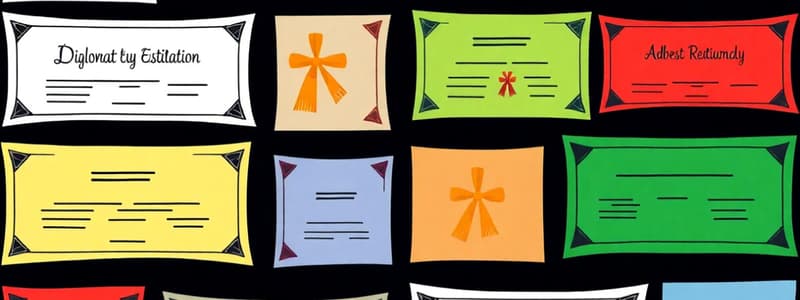Podcast
Questions and Answers
What is the primary purpose of a diploma?
What is the primary purpose of a diploma?
- To provide professional networking opportunities
- To signify the completion of a course of study (correct)
- To allow students to enroll in any course without prerequisites
- To serve as a temporary identification document
Which type of diploma is awarded after two years of study?
Which type of diploma is awarded after two years of study?
- Associate Degree (correct)
- High School Diploma
- Graduate Diploma
- Bachelor's Degree
What type of diploma is often focused on professional development?
What type of diploma is often focused on professional development?
- Bachelor's Degree
- High School Diploma
- Graduate Diploma
- Professional Diploma (correct)
What is the first step in the process of earning a diploma?
What is the first step in the process of earning a diploma?
How many years of study are typically required for a bachelor's degree?
How many years of study are typically required for a bachelor's degree?
What is a key consideration when earning a diploma?
What is a key consideration when earning a diploma?
Which of the following is considered an alternative credential?
Which of the following is considered an alternative credential?
What does the term 'diploma' originate from?
What does the term 'diploma' originate from?
Flashcards are hidden until you start studying
Study Notes
Definition
- A diploma is a formal document awarded by an educational institution, such as a school or university, to signify that a student has successfully completed a course of study or degree program.
Types of Diplomas
-
High School Diploma
- Awarded upon completion of high school education.
- Typically requires a specific number of credits in various subjects (e.g., math, science, language arts).
-
Associate Degree
- Granted by community colleges or vocational schools after two years of study.
- Focuses on general education and specific fields such as nursing or business.
-
Bachelor’s Degree
- Awarded by colleges and universities after four years of undergraduate study.
- Includes a major area of study and general education requirements.
-
Graduate Diploma
- A post-bachelor's qualification that typically requires one year of study.
- Often focused on professional development or specialized knowledge.
-
Professional Diploma
- Recognized for advanced professional skills in specific industries.
- May require work experience in addition to academic coursework.
Purpose and Importance
- Validates a student's educational achievements.
- Often required for employment, particularly in specialized or professional fields.
- Can enhance career opportunities and potential salary.
Alternative Credentials
- Certificates: Shorter programs focusing on specific skills or trades.
- Degrees: Higher-level qualifications (master's, doctorate) that provide advanced knowledge.
Process of Earning a Diploma
- Enrollment: Students enroll in an educational program.
- Coursework: Completion of required courses, including assignments and exams.
- Assessment: Evaluation of academic performance through grades and assessments.
- Graduation: Formal recognition of program completion, typically involving a ceremony.
Considerations
- Accreditation: Ensure the institution is accredited for credibility and acceptance of the diploma.
- Transferability: Some diplomas may allow credits to transfer to other educational programs.
Historical Context
- The term "diploma" originates from the Greek word "diploma," meaning "folded paper," historically used for documents indicating a person's qualifications or achievements.
Challenges
- Accessibility: Not all individuals have equal access to educational opportunities to earn diplomas.
- Perceptions: The value of diplomas can vary greatly in different industries and regions.
Trends
- Online Diplomas: Increasingly popular due to flexibility and accessibility of online education.
- Skills-Based Hiring: Some employers prioritize skills and experience over traditional diploma requirements.
Diploma Definition and Types
- Formal document awarded by educational institutions to recognize completion of a course or program.
- High School Diploma: Awarded after completing high school, typically requires credits across subjects.
- Associate Degree: Granted by community colleges or vocational schools, typically requires two years of study, focuses on general education and a specific field.
- Bachelor's Degree: Awarded by colleges and universities, requires four years of undergraduate study, includes a major and general education courses.
- Graduate Diploma: Post-bachelor's qualification, often requires one year of study, focused on professional development or specialized knowledge.
- Professional Diploma: Recognized for advanced skills in specific industries, may require work experience in addition to coursework.
Purpose and Importance
- Validates a student's educational achievements.
- Often required for employment, especially in specialized or professional fields.
- Can enhance career opportunities and potential salary.
Earning a Diploma
- Enrollment: Students enroll in a program at an educational institution.
- Coursework: Complete required courses, including assignments and exams.
- Assessment: Evaluation of academic performance through grades and assessments.
- Graduation: Formal recognition of program completion, often involving a ceremony.
Diploma Considerations
- Accreditation: Ensure the awarding institution is accredited for credibility and acceptance of the diploma.
- Transferability: Some diplomas may allow credits to transfer to other educational programs.
Historical Context
- The term "diploma" originates from the Greek word "diploma," meaning "folded paper," historically used for documents indicating qualifications or achievements.
Challenges to Diplomas
- Accessibility: Not all individuals have equal access to educational opportunities to earn diplomas.
- Perceptions: The value of diplomas can vary greatly in different industries and regions.
Diploma Trends
- Online Diplomas: Increasingly popular due to flexibility and accessibility of online education.
- Skills-Based Hiring: Some employers prioritize skills and experience over traditional diploma requirements.
Studying That Suits You
Use AI to generate personalized quizzes and flashcards to suit your learning preferences.




